Commentary
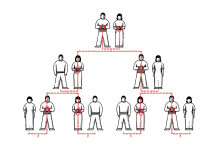
IN MAY, DELEGATES at the annual convention of the Episcopal Diocese of Maryland voted unanimously to affirm the principle of reparations for the uncompensated labor of enslaved persons. In a diocese that is more than 90 percent white, there was not a single nay vote. How did this happen?
The issue of reparations is mired in emotion, often mischaracterized, and largely misunderstood. The economic, political, and moral dimensions are difficult to grasp. Some of us have an emotional response to the word, but when reparations are fully and fairly explained, Americans want to do the right thing.
Everyone living in our great nation has inherited a mess created by the institution of slavery. None of us caused this brokenness, but all of us have a moral responsibility to fix it.
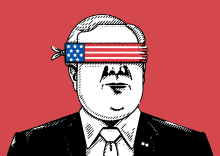
THE 2018 STATE-SPONSORED execution of Jamal Khashoggi, a Saudi journalist and Washington Post columnist, was a brazen violation of his right to life by a repressive regime, yet the U.S. executive branch responded with near indifference. Then Secretary of State Rex Tillerson had already said that advancing U.S. interests should come before promoting U.S. values—such as defending human rights—and his successor Mike Pompeo has followed suit.
The Trump administration has disavowed the longstanding commitment to human rights by the U.S. in foreign policy. It has withdrawn from the U.N. Human Rights Council, ceded a voice on the U.N. body addressing racial oppression, and ignored the chorus of international condemnation of its family separation policy.
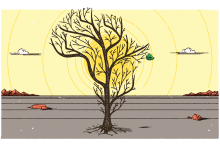
THIS YEAR, THE seasonal rains in Kenya came two months late. “Even the weatherman can’t forecast the weather,” Stephen Katama, a local shopkeeper in Nairobi, told me when I traveled to East Africa in June. “We can’t tell the difference between the summer and winter here anymore.”
During the past two decades, rain in sub-Saharan Africa has increased in frequency and intensity, creating dangerously erratic patterns of rainfall and drought. A single day’s downpour may bring the amount of rainfall normally expected over a period of eight months, wreaking havoc on the livelihoods of countless subsistence farming families across Kenya and Uganda.
Sub-Saharan Africa is among the regions projected to see the worst of climate change in the coming decades. I traveled with the Climate Witness Project, hosted by the Christian Reformed Church in the U.S., to Nakuru, Kenya, and North Teso and Soroti, Uganda, to visit farming communities facing extreme shifts in weather patterns.
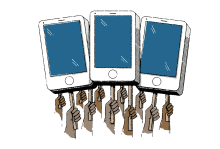
f you’ve checked your social media recently, you may have noticed profile pictures with a blue background. This is how some are showing solidarity with the peaceful demonstrators in Sudan who, in the face of extreme violence and a near-total internet blackout, are demanding a civilian government.
Last December, the Sudan Professionals Association (SPA), an umbrella organization of trade unions, organized a large demonstration in Khartoum, the nation’s capital, focused on the dire economic situation in the country. The public outpouring grew as people took to the streets in more than 90 locations throughout Sudan. These new protests, triggered by price hikes and food shortages, quickly developed into anti-government protests and inspired even more actions around the country. The SPA decided to change its target: Instead of focusing on the economy, the SPA began to demand the removal of the military-led regime.
Sudan is not new to nonviolent revolutions. The Sudanese took to the streets in organized mass demonstrations and general strikes that ended dictatorships in 1964 and 1985.

A succession of lawsuits involving the state of Michigan, the American Civil Liberties Union, and Christian adoption agencies has again pitted religious freedom against LGBTQ rights.
In 2017, after a same-sex couple seeking to adopt was turned away by Bethany Christian Services and St. Vincent Catholic Charities, the ACLU took the couple’s case to court. In March, the case was settled in favor of the LGBTQ clients. Adoption agencies that receive funds from the state of Michigan can no longer turn away LGBTQ couples or individuals because of religious objections. In response, Bethany—the largest Christian adoption and foster agency in the U.S. and headquartered in Michigan—reluctantly changed its policy in the state to allow LGBTQ couples to foster children. In contrast, St. Vincent filed a follow-up lawsuit against the state human services department.
“We are disappointed with how this settlement agreement has been implemented by the state government. Nonetheless, Bethany will continue operations in Michigan, in compliance with our legal contract requirements,” a Bethany spokesperson said in a statement.

SINCE MY ARRIVAL in the U.S., I have looked forward to the day that I could enjoy the security of American citizenship. But as a green card holder of African origin, I now watch the Trump administration ramp up efforts to strip hundreds of naturalized Americans of their citizenship. With the establishment of a “denaturalization” task force, the supposed permanence of citizenship has become insecure.
In 2019, the Trump administration requested $207.6 million to review 700,000 immigrant files and develop elaborate efforts to punish people for past mistakes by denaturalizing them. As many keep their eyes on Trump’s pet project, the southern “border wall,” the administration continues to use taxpayers’ funds to construct harmful, longer-lasting obstacles to citizenship.
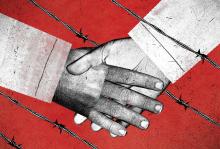
N ANY DEEP national division, political peace is critical. The absence of a formal peace treaty between North Korea and South Korea and the U.S. is an enormous barrier to a new future. Yet easily overlooked is that lasting peace also requires decades-long work of people-to-people engagement.
Novelist Chimamanda Ngozi Adichie has spoken of “the danger of a single story.” In few places is that danger more real than between North Koreans and Americans who are profoundly misinformed about each other after 70 years of mutual isolation.

AS PART OF his annual commencement speech tour, Vice President Mike Pence warned graduates at Christian colleges such as Liberty University that they would be “shunned or ridiculed for defending the teachings of the Bible” and adherence to “traditional Christian beliefs.” As an example, Pence cited the backlash he and his wife, Karen Pence, received after she took a job at Immanuel Christian School in Springfield, Va., a private Christian school that bans LGBT employees and students and the children of gay parents.
What the vice president and many like him are describing, however, is not an infringement of their rights or persecution, but theological disagreement and different beliefs that are as protected as their own. While the Constitution protects their right to choose their religion and how to practice their beliefs, the Constitution does not protect against theological or philosophical disagreements.

CREDIT CARD DEBT plagues our communities. The average U.S. household carries a balance of $6,929 at the end of the month. And if you miss a payment, interest may jump from 15 percent to more than 20 percent.
Credit cards are part of a predatory industry with a history of racial bias. Many people can afford only the minimum monthly payment, barely making a dent in the principal —just as the system was designed.
About 10 years ago at Circle of Hope, my church in Philadelphia, we began experimenting with “credit card debt annihilation.” Our team’s motto came from Romans 13, where the apostle Paul urged believers to “owe no one anything,” except love.

“WE'RE NOT HERE to seduce you,” I said.
The laughter signaled that my comment had pushed a boundary but not broken it. When the moderator at my evangelical seminary’s student orientation asked about friendships between men and women on campus, I answered honestly. I wanted to be viewed as a student, not a threat.
Women seminarians, regardless of where we study, navigate a world not made for us. Many of us study in institutions with long histories of denying our admission, read from syllabi devoid of women scholars, and study under professors who merely tolerate our presence. My own seminary first admitted women as full students in 1975 and into all degree programs in 1986.
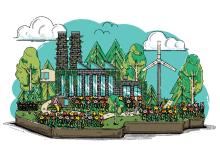
SOON AFTER SENATE Majority Leader Mitch McConnell brought the resolution for a Green New Deal to a sham procedural vote in March, a clip of its co-sponsor, Alexandria Ocasio-Cortez, went viral.
“You want to tell people that their concern and their desire for clean air and clean water is elitist? Tell that to the kids in the South Bronx which are suffering from the highest rates of childhood asthma in the country,” Ocasio-Cortez said. “Tell that to the families in Flint whose kids’ blood is ascending in lead levels.”
It was an illuminating statement. The Green New Deal had rapidly emerged on the heels of a report by the U.N. Intergovernmental Panel on Climate Change that puts the deadline for massive, coordinated action to avoid the worst of climate change at 12 years out. Now is the time for an audacious proposal of the kind climate activists have long pushed for, one that matches the planetary crisis in scale and scope.
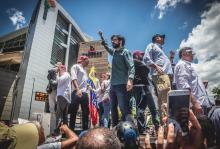
THE DAY A massive electrical blackout plunged Venezuela into darkness, my neighbor Juan Carlos was finally heading back to seventh grade.
It had been four months since he had entered a classroom. His teachers had been missing since November, their $8 a month salary not covering even the commute. Doing the math, I realized that my two hens earned more with their daily eggs.
Leaving his darkened school, Juan Carlos headed straight to the potato field. I watched from the porch as he dropped to his knees to rastrojear—rake the field with his hands to uncover spuds missed in the harvest. The field’s owner turns a blind eye to kids searching for food this way.
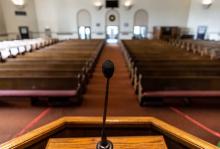
AS AN EVANGELICAL woman in leadership, I’m grateful for the good intentions of many white evangelical men in leadership. In the spaces where I move, many well-meaning folks are trying to be supportive of women, gender minorities, and people of color. They’re trying to be generous with the privileges their gender or race may give them.
While I’m grateful for the heart behind these attempts at support, in many evangelical and other Protestant circles, these kind intentions often perpetuate the dynamics they mean to discard. A speaker, while introducing me, tried to help by saying, “What she’s saying is really important, you should listen to her.” Though it was a kind thought, he maintained his position of power by establishing himself as an authority over my content.
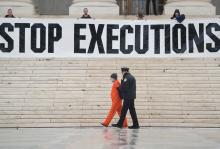
ON MARCH 13, California Gov. Gavin Newsom signed an order issuing a moratorium on the state’s death penalty—providing a reprieve from execution for 737 people on death row. Newsom cited as reasons that the ultimate penalty provides no public safety benefit and has no value as a deterrent. As someone who has worked as a public defender inside the criminal justice system for 30 years, I applaud the humanity and compassion of his decision.
While the number of countries that employ the death penalty dwindles, the United States and several others still enforce it. Despite strong empirical evidence to the contrary, we are led to believe capital punishment is reserved for the “worst of the worst” and that it is supported by victims and law enforcement alike. Leaving aside that 156 people on death row nationwide have been exonerated since 1973, the death penalty is discriminatory in its application and in the selection of those whom the state seeks to kill. It is largely sought because of the economic status of the defendant, the race of the victim and the defendant, and where the crime took place, not because of the circumstances of the offense.

I REMEMBER THE EXACT DAY I discovered that some conservative Christians are not all that into democracy. It was 20 years ago. My daughter asked me for help with her social studies homework. I discovered that her Christian school taught a neo-Puritan civics curriculum, which proclaimed that God’s design for human government is rule by “godly Christian men” applying scripture under the sovereignty of God. I was shocked.
In the Trump era, we again witness a conservative Christian flirtation with authoritarianism. These conservative Christians compare Donald Trump to Cyrus of Persia—both authoritarian rulers, both “friendly” to but not part of God’s people, both supposedly used by God—and Trump is lauded as the president of divine providence in shlock films such as Liberty U.’s The Trump Prophecy.
Meanwhile, a quote attributed to Russian Orthodox priest and monarchist St. John of Kronstadt that “in hell there is democracy, in heaven there is a kingdom” is making the rounds on social media, occasioning much comment leaning in the direction of authoritarian rule. John of Kronstadt died in 1908 before the Russian revolution and likely associated democratic tendencies with atheism.

ON APRIL 1, 2020, the United States will hold its 24th national census, taking demographic stock of its population, some 330 million people in more than 140 million households. The census is one of the greatest equalizing forces in society, with a goal of counting each person living in the U.S. to apportion political representation through state and congressional redistricting and to allocate hundreds of billions of dollars in federal funding to states, counties, and communities. The census reflects the changing face of a nation.
Accordingly, the 2020 census will see several firsts: the first to ask about same-sex marriage, the first using an online method as the primary mode of response, and the first to request specific details on ethnic origins within racial categories such as “White” and “Black.”
Many embrace the census for the opportunity it presents to redefine our national portrait. Many fear and distrust it for the same reason.
The Trump administration has proposed reintroducing a question on citizenship status that has not been on the census since 1950. Its possible inclusion has raised outcry and constitutional challenges from multiple quarters claiming that a citizenship question could lead to significant underreporting from documented and undocumented immigrant communities. Although the U.S. Census Bureau promises that all census data is confidential and protected by law, many fear data could be shared with other government agencies to target immigrants, punish “sanctuary cities,” and more.
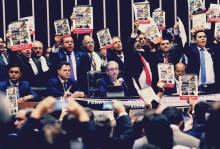
JAIR BOLSONARO, Brazil’s recently elected president, chose as his campaign theme “Brazil above everything, God above everybody.” The first phrase is a shout from his days as a military parachutist and the second a nod to the growing power and influence of evangelicals in Brazil.
According to the 2010 Brazilian census, evangelicals—who control extensive media networks and are increasingly involved in politics—make up 22 percent of the population, up from only 9 percent two decades earlier.
Churches such as the Assemblies of God and the prosperity gospel-influenced Universal Church of the Reign of God have used various forms of media to reach larger audiences, starting with local radio stations in the 1960s and 1970s. In 1989, the Universal Church bought a national television network, Rede Record. It is now the second largest network in Brazil and strongly supports Bolsonaro. Today the Universal Church owns more than 20 television stations and 50 radio stations, as well as publishing companies and studios.
In 1986, when the first election after 20 years of military dictatorship was held, the number of Protestant lawmakers jumped to 36, with 20 Pentecostals joining the evangelical caucus. For the first time, a journalist used the term Bancada da Biblia (Bible Bench). Since then, the number of evangelicals has increased in each Congress, except in 2006 when several were involved in scandals ranging from a payment-for-votes scheme to the “Bloodsuckers Operation” that uncovered hospital payment fraud.
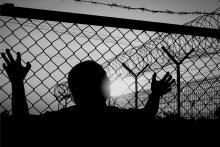
AT 146 CCA ROAD in Lumpkin, Ga., sits the Stewart Detention Center, one of the nation’s largest immigrant holding facilities. It’s also a multimillion-dollar revenue-generating business. The nearly 2,000-bed facility, originally built as a medium-security prison, is owned and operated by CoreCivic (formerly known as the Corrections Corporation of America), the second largest private prison firm in the United States.
Private detention centers, such as Stewart, are major sources of revenue for the private prison industry. CoreCivic is currently trading on the New York Stock Exchange with market capitalization of more than $2.36 billion. The private corrections industry, according to a 2017 Mother Jones article, has received endorsements from then-Attorney General Jeff Sessions and President Donald Trump. The industry’s stocks soared after the president’s executive order to expand the purview of Immigration and Customs Enforcement. With billions in revenue being generated and a government not relenting from its war against undocumented immigrants, private detention centers such as Stewart seem to be here for the long haul.
Stewart is plagued with “chronic shortages,” especially in its medical facility. There are reports of drug smuggling, suicides, and mixing asylum seekers with convicted criminals. Between 2007 and 2012, only 6 percent of detainees at Stewart received legal counsel during their immigration process; only 4 percent were granted asylum. Most undocumented immigrants at Stewart will spend their only time in the U.S. locked up with hardened criminals, subjected to inhumane treatment.

THOMAS KUHN INTRODUCED the term “paradigm shift” into common parlance in the 1960s. New paradigms teach us to see the world differently. When we receive a new paradigm, all the data flees the old one and settles into the new. For Kuhn, the classic example of a paradigm shift is the way Copernicus’ solar-centered model of the world displaced Ptolemy’s Earth-centered theory during the European Renaissance.
I knew all of that. But when Irish poet Micheal O’Siadhail referred to Copernicus as “Copernik” in his recent release, The Five Quintets, it set me toward a new thought. “Copernik” (first name Nicolaus) sounds a lot like “Kaepernick” (first name Colin).
It followed for me that Copernik (with his solar-centered hypothesis) and Kaepernick (with his refusal to stand during the national anthem at NFL games) were up to the same thing. Both performed new paradigms. While Copernik’s is now settled theory, Kaepernick’s remains highly contested. It is, moreover, highly contested precisely because it is a new paradigm that threatens everything invested in the old paradigm.
The old paradigm, so treasured in the NFL, consists in a drama of violence, money, and sex (covered by pseudo-nationalism). It provides for rich white “owners” to stage violent struggles between mostly black players. That old paradigm requires black players to conform to the ideology of white owners who use the U.S. flag to legitimate their enormous wealth and control, as if these were somehow patriotic. And because the liturgy of sex-money-violence-nationalism has become so ordinary and routine, no one notices it—exactly how the owners prefer.
Now comes Colin Kaepernick with a new paradigm that asserts that black players are free agents who are not “owned” and who do not need to participate in, collude with, or endorse the owner’s ideology.

HUMAN RIGHTS MONITORS have been raising alarms about the treatment of Christians in China. A report from Open Doors World Watch List said that Asia is “the new hotbed of persecution for Christians.” Some Chinese church leaders are saying, “It’s the worst since the Cultural Revolution ended in 1976,” according to an Open Doors spokesperson.
Over the past 30 years, China has undergone one of the largest social and economic transformations ever seen. Nearly a billion people moved from peasantry to a modern middle-class lifestyle. While this change involved enormous economic progress for many people, it also entailed massive migrations, deep reorganization of family structures, and extensive urbanization. These came with growing social inequalities, rampant corruption, and environmental disasters.
In 2012, Xi Jinping was appointed as the new general secretary of the Communist Party; he became president in 2013. Xi has required extreme party loyalty and encouraged various economic reforms. Although his policy reduced corruption and smoothed the country’s transition, the changes have not protected China from a concerning economic slowdown.
In the context of this massive transformation, what specific difficulties affect Chinese Christians?
China has gained more Christian believers over the past 40 years, with the number of Chinese Protestants increasing by an average of 10 percent per year since the late 1970s, but Christians still represent only 2 to 4 percent of China’s population. Despite their increase, Christians are neither a threat to social cohesion nor a major political challenge to Beijing. The state is far more concerned about a trade war with the U.S., China’s aging population, and environmental damage. And, despite its communist legacy, Beijing is not specifically obsessed with religion, or Christianity in particular.